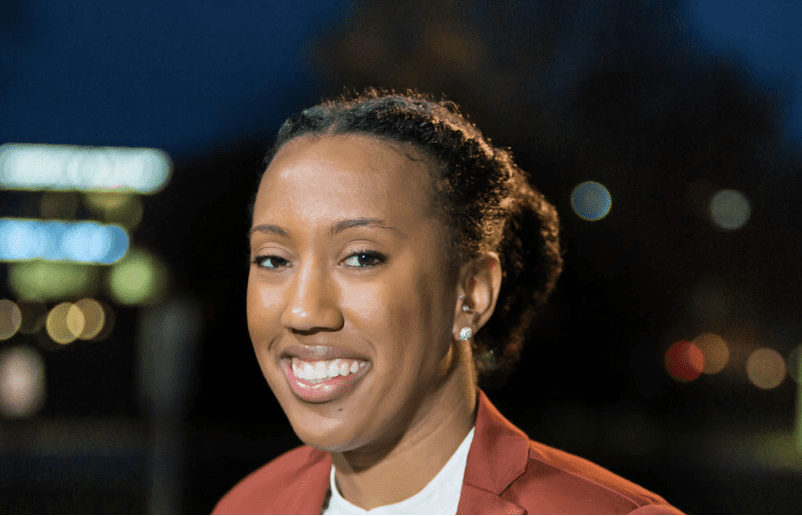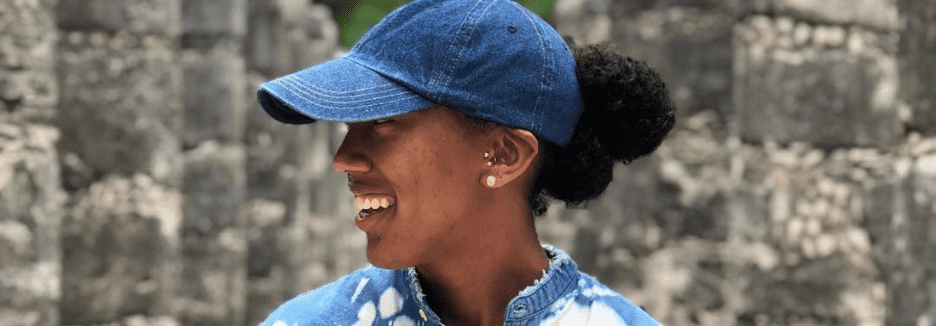Storyblocks hires cool people that you should know about – that’s why we’re launching a new blog series called On the Block. In this series, Storyblocks brand manager Tia Konitzer will sit down with a Storyblocks employee from one of our business resource groups to learn why they chose Storyblocks and how their unique experiences help shape their work. Interviewees will range from engineers to video producers, and we’ll be giving you advice on how to achieve success in these functional areas along the way. This month we’re highlighting our NBA referee turned software engineer, Gerda Gatling. How a NBA basketball referee made the career pivot to engineering.
What was your journey to the NBA?
I worked in Finance for about four years at several banks and to be transparent, I was unhappy and unfulfilled. I was attending a board meeting for the Stony Brook Black & Latino Network when an alum from my university who then worked in career development for the NBA told me about a program that they had started for former players to become referees. So obviously I was extremely excited. I was the last interviewee on the last day of interviews, was able to earn a spot and roster to train to be a pro referee.
How would you describe the NBA culture?
I always had the feeling that Finance just wasn’t for me. I knew that I needed to be in a more forward-thinking culture. At the NBA, the culture is more forward-thinking than Finance and actively promotes social justice, innovation, and change. Also, in Finance you’re counting numbers, you’re sitting at a desk all day, a little bit more stagnant. At the NBA you get to travel around the world and meet some of the best minds in sports!
So it sounds like you had a great experience at the NBA. Why did you decide to make the pivot to engineering?
Yeah the NBA was a really great 3 year experience and it definitely helped propel my referee career. That being said, I’ve always found it important to train my mind just as much as I train my body. Refereeing can be physically grueling and at times can have direct impact on mental health. I chose to pivot into engineering not only because it allows me to solve technical and creative problems which means I’ll be an asset to any company, but it also gives me the ability to build my skillset off the court which has always been important to me since playing basketball in college.
The engineering landscape is growing and changing – I learned about the opportunities coding bootcamps provide as a nontradional path of entry while I was still working in finance and I’ve been hooked ever since. Not to mention, the traditional flexibility of working in tech still allows me to use the skills I learned while working at the NBA to referee Women’s Division I College basketball.

Why did you choose Storyblocks?
I learned about Storyblocks through a close friend who also did a bootcamp. He sent me a website where he found his first job out of bootcamp that listed a bunch of startups and I liked the fact that Storyblocks had a built-in mentorship. So for me, as someone who was pivoting, I was like, I definitely need to have that as I continue to grow as an engineer. Also everyone I interviewed with seemed genuine and authentic.
You are a member of all of the BRGs at Storyblocks (Women of Storyblocks, Black Storyblocks, and Out at Storyblocks). How has that community experience been?
What I love about the BRGs is that it provides a little community or safe spaces for various underrepresented groups. This is important especially coming from larger companies where there were a lot more people that look like me. I think it gives people a space to be themselves. We work on a lot of dope projects and initiatives. So that’s been very rewarding, just to work with people I consider friends on initiatives that are not only important to us but important to the company and community at large. I’m excited to see how we continue to grow them individually as well as continue to find areas where we can link up to support and collaborate with each other.
How has your life experience shaped your work as an engineer?
Everybody wants to become an engineer, but it’s not easy. The first step is getting started on a problem and the second step is actually sticking with it. It’s not easy, but I think my sports background definitely helps me overcome a lot of the mental hurdles. I know that if I don’t get something on the first try, that’s okay. There are times where you’re going to get a play wrong, going to miss a shot, but you can’t quit in the middle of the game. And just like you can’t quit in the middle of a game, I can’t quit in the middle of a project.
What would you say to businesses that say that they are struggling to find underrepresented talent?
I mean, honestly, it’s tough. There are not as many of us as there are our white male counterparts in engineering, but it’s not impossible. There are Black and Brown engineers out there, but you just have to think outside of the box. Black communities are usually into networking and relationship building. So a lot of times you’re going to just have to get out there and build your name as a trustworthy brand.
I know like when I was applying to roles, there were somewhat white technical leaders that would attend Afrotech even though it’s… obviously geared toward black tech professionals, but they were out there because they wanted to show black engineers and other tech professionals that they are valued and they want diverse people on their teams. And I think for me, that just goes further than just saying we want diverse talent – you have to show them that you truly value diverse representation, and sometimes that means engaging in spaces that might be non-traditional places to form relationships.
What advice would you give to someone that wants to make the pivot to engineering but doesn’t know where to start?
I think the main thing is that you have to really believe in yourself and know that’s possible. It doesn’t matter if you’re a barista at Starbucks, you can become an engineer if you believe in yourself and are willing to put in the work, because believe me – pivoting is a lot of work but it’s worth it. With that being said, don’t devalue any prior experience you have! Your previous experiences and perspectives are still valuable.
Also, use as many free resources as possible. There’s no need to go back to school necessarily and get a computer science degree. There’s a lot of free resources out there. A lot of times finances can be a barrier to entry in a lot of professions. The best thing about tech is that the barrier to entry isn’t necessarily there. So you have to take advantage of that, try and find someone who’s done it, get a mentorship, and bounce ideas around. There are a lot of scholarships where people of color can join boot camps and other similar programs. So get all the free resources and really expose yourself to engineering before you jump and pay for a class.
Any specific resources that you used to pivot?
Free Code camp was a good resource, plus it’s free so perfect for when you’re just starting out. The bootcamp that I went to was sponsored by American Express and General Assembly. I was able to get a full scholarship, but that really came about from a Google search. YouTube is also another great resource for free information and coding tutorials. Another thing I did when I was considering pivoting was to join multiple social networks for underrepresented groups that I consider myself a member of, for example Black in Tech and Women Who Code and I would ask members in slack or groupme for advice.
Final words to someone that is nervous about taking the leap?
You’re definitely capable. Any question that you have on your capability, eliminate it. The way that you approach problems and your different views on the business are valuable perspectives, you have to use that to your advantage and know that you are an asset. The decision you make to pivot will also help elevate generational wealth in your community which has been disadvantaged for so long. There is space for you in tech and in engineering specifically, but you just have to just get out of your own way.
Interview Profile
Gerda Gatling
Associate Software Engineer at Storyblocks




